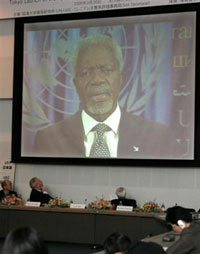 |
| Participants in a meeting on the
Millennium Ecosystem Assessment listen to U.N. Secretary
General Kofi Annan speaks through a video at the U.N.
University in Tokyo Wednesday, March 30, 2005. (AP
Photo/Katsumi
Kasahara) | |
Growing populations and expanding economic
activity have strained the planet's ecosystems over the past half century,
a trend that threatens international efforts to combat poverty and
disease, a U.N.-sponsored study of the Earth's health warned on Wednesday.
The four-year, $24 million Millennium Ecosystem Assessment found humans
have caused heavy damage or depleted portions of the world's farmlands,
forests and watercourses.
Unless nations adopt more eco-friendly policies, increased human
demands for food, clean water and fuels could speed the disappearance of
forests, fish and fresh water reserves and lead to more frequent disease
outbreaks over the next 50 years, it warned.
"This report is essentially an audit of nature's economy and the audit
shows that we have driven most of the accounts into the red," Jonathan Lash, a member of the
Millennium Ecosystem Assessment board, said in London.
The report said degradation of ecosystems was a barrier to achieving
development goals adopted at the U.N. Millennium Summit in Johannesburg,
South Africa in September 2000: halving the proportion of people without
access to clean water and basic sanitation by 2015 and improving the lives
of 100 million slum dwellers
by 2020.
Walter Reid, director of the Millennium Ecosystem Assessment, said over
the past 50 years humans had changed ecosystems more rapidly and
extensively than any comparable period in human history.
"These changes have resulted in a substantial and largely irreversible loss to the biological
diversity of the planet," Reid said.
U.N. Secretary-General Kofi Annan said the Millennium Ecosystem
Assessment "tells us how we can change course," and urged nations to
consider its recommendations.
The study was compiled by 1,360 scientists from 95 nations who pored
over 16,000 satellite photos from the U.S. National Aeronautics and Space
Administration, and analyzed statistics and scientific journals.
Their findings highlight the planet's problems at the end of the 20th
century, as the human population reached 6 billion.
Conservation groups called on governments, businesses and individuals
to heed the study's warnings.
(Agencies) |
本周三(3月30日),聯(lián)合國主持的一項(xiàng)“地球健康狀況”研究活動(dòng)對(duì)人們發(fā)出預(yù)警:在過去半個(gè)世紀(jì)中,人口的不斷增長和日益繁多的經(jīng)濟(jì)活動(dòng)使地球的生態(tài)系統(tǒng)不堪重負(fù),這種趨勢(shì)向致力于消除貧窮和疾病的國際力量敲響了警鐘。
這項(xiàng)歷時(shí)四年,耗資2400萬美元的“千禧生態(tài)系統(tǒng)評(píng)估”顯示,人類對(duì)地球上的農(nóng)田、森林和河道造成了巨大的破壞,其中的部分資源已經(jīng)衰竭。
報(bào)告還警告說,在今后50年內(nèi),如果各國不采取更有利于生態(tài)環(huán)保的政策,人類對(duì)食物、凈水和燃料的不斷需求將加速森林、魚類和新鮮水資源的消失,并導(dǎo)致疾病更加頻繁地爆發(fā)。
千禧生態(tài)系統(tǒng)評(píng)估委員會(huì)的成員喬納森·拉什在倫敦說:“這份報(bào)告本質(zhì)上是對(duì)‘自然的經(jīng)濟(jì)’的一次審核,結(jié)果顯示我們的大部分賬戶上已經(jīng)出現(xiàn)了赤字。”
報(bào)告指出,生態(tài)系統(tǒng)的惡化已經(jīng)阻礙了聯(lián)合國千禧(地球)峰會(huì)(2000年9月在南非約翰內(nèi)斯堡舉行)制定的發(fā)展目標(biāo):到2015年,使不能獲取凈水和基本衛(wèi)生設(shè)施的人口比例減半;到2020年,使居住在貧民窟的一億人的生活得到改善。
“千禧生態(tài)系統(tǒng)評(píng)估”的負(fù)責(zé)人沃爾特·里德說,在過去50年中,人類對(duì)生態(tài)系統(tǒng)的改造比歷史上的任何時(shí)期都更為迅速而廣泛。
里德說:“這些變化導(dǎo)致地球上的生物多樣性發(fā)生了幾乎不可挽回的重大損失。”
聯(lián)合國秘書長科菲·安南表示,千禧生態(tài)系統(tǒng)評(píng)估“教我們?nèi)绾胃淖兪挛锏陌l(fā)展進(jìn)程”,并呼吁世界各國認(rèn)真考慮評(píng)估組提出的建議。
這項(xiàng)研究由來自95個(gè)國家的1360名科學(xué)家協(xié)力完成,他們閱覽了美國國家航空航天部提供的16000張衛(wèi)星照片,并對(duì)所得數(shù)據(jù)和一些科研期刊進(jìn)行了分析。
他們的發(fā)現(xiàn)進(jìn)一步凸顯了隨著20世紀(jì)末地球人口達(dá)到60億,這顆行星出現(xiàn)的種種問題。
各類自然資源保護(hù)組織紛紛號(hào)召政府、企業(yè)和個(gè)人對(duì)研究提出的警告予以重視。
(中國日?qǐng)?bào)網(wǎng)站譯) |
